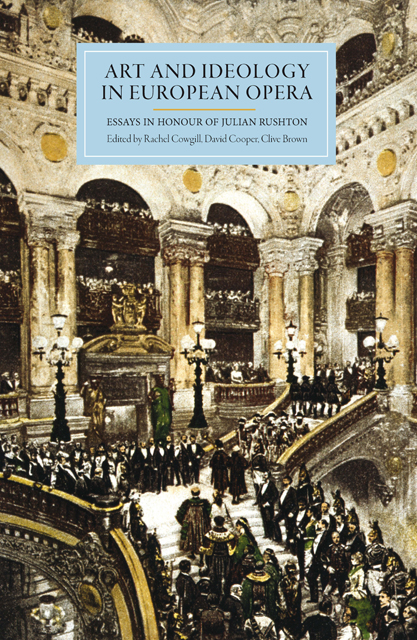Book contents
- Frontmatter
- Contents
- List of Figures
- List of Music Examples
- List of Tables
- Notes on Editors and Contributors
- Acknowledgements
- Introduction
- I Nationalism, Cosmopolitanism and National Opera
- II Opera, Class and the Politics of Enlightenment
- III Opera and Otherness
- Julian Rushton: A Family Memoir
- 7 The Works of Julian Rushton
- Index
- Tabula Gratulatoria
11 - Carl Nielsen’s Carnival: Time, Space and the Politics of Identity in Maskarade
Published online by Cambridge University Press: 28 February 2023
- Frontmatter
- Contents
- List of Figures
- List of Music Examples
- List of Tables
- Notes on Editors and Contributors
- Acknowledgements
- Introduction
- I Nationalism, Cosmopolitanism and National Opera
- II Opera, Class and the Politics of Enlightenment
- III Opera and Otherness
- Julian Rushton: A Family Memoir
- 7 The Works of Julian Rushton
- Index
- Tabula Gratulatoria
Summary
At the beginning of March 2007, the Danish capital Copenhagen made a rare appearance in international news headlines following three nights of rioting in the Norrebro and Christianshavn districts to the north and east of the city centre. The immediate cause of the civil unrest was a series of increasingly violent street protests led by a group of students and squatters evicted from a building on Jagtvej, known as Ungdomshuset, which city authorities had sold to a right-wing Christian family organization. Protestors claimed right of ownership, and attacked the government's decision to proceed with the sale as an ideological attempt to pursue a highly conservative social agenda. Other commentators, however, strongly supported official attempts to curb the street demonstration and advance the work of a charitable religious organization apparently promoting traditional family values. Though international controversy and social unrest have not been entirely without precedent in the Danish capital in recent years, the latest Norrebro riots struck at the heart of Danish notions of liberalism, freedom and tolerance, and reinscribed familiar tensions between social permissiveness and conformism that have echoed repeatedly, if faintly, throughout Danish history. Indeed, despite Denmark's (problematic) image as a quiet, liberal and socially enlightened corner of northern Europe, promulgated repeatedly in the contemporary media, such tensions lie at the focal point of historical and contemporary debates about the nature of Danish identity.
Similar tensions, albeit of a less violent and explosive nature, run through Carl Nielsen's great comic opera, Maskarade [Masquerades] (1904–6). Because of its popular domestic success, Maskarade has assumed the canonic status of Denmark's ‘national opera’. But beneath the music's seemingly innocent and attractive melodic surface lie elements of social division and class unrest, as well as celebrations of community and belonging. Indeed, in many senses the whole opera hinges on a debate about social freedom that anticipates the arguments raised by the Christianshavn protestors, and the image of Danish society that Maskarade presents is ultimately a fragile and potentially unstable one. The plot of Maskarade is based on Ludvig Holberg's play of the same name (1724), set in early eighteenth-century Copenhagen.
- Type
- Chapter
- Information
- Art and Ideology in European OperaEssays in Honour of Julian Rushton, pp. 241 - 262Publisher: Boydell & BrewerPrint publication year: 2010

